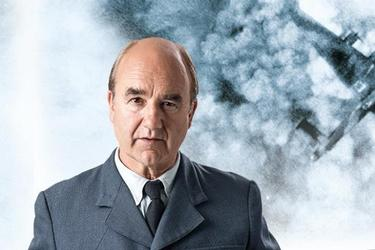Pressure: Brilliant war drama
Pressure, David Haig's co-written play, enthrals
A brilliant war-time drama about a man under pressure
How can anyone create a compelling play around the weather? Pressure, written and starring David Haig, pulls it off.
An actor so convincing he could probably have an audience on the edge of their seats reading from a bus timetable, he takes the stage by storm in his role as master meteorologist, Dr. James Stagg -- and keeps them mesmerized to the end of a long play.
To be fair, this isn’t just the power of David Haig’s stage presence. The weather in question is a vital component of the drama. On its behavior rests the lives of hundreds of thousands of men. It is 1944 and D-Day is approaching. General Eisenhower and his mighty Chiefs of Staff have co-opted in this earnest Scotsman to the Allied Command.
'The family' as they call themselves, need to know if June 5th, the day they’ve been preparing for through years of bitter suffering, is the right one. On this day – and its winds, wave heights, its low or high pressure -- rests the entire war effort. As Dr. Stagg bustles into his scruffy office, we realize he is not a man familiar with the subtleties of conversation but as this earnest scientist sets up his laboratory in the tatty, minimally equipped room he’s assigned; it’s also clear he is meticulous, focused and very honest.
He is about to begin his preparations for prognosis of weather events when his opposite number Colonel Irving P Krick played with maximum aggression and ego by a brilliant Phillip Cairns. Krick has been through the desert with Ike and his Eighth Army, and predicted the daily conditions with amazing accuracy. He doesn’t agree with Stagg that the weather on the 5th June D-Day as planned, will be stormy rainy with visibility down to yards. Stagg has to point out that it’s easy to predict conditions in Morocco Tunisia and the Western Desert, harder for the South Coast of England. Stagg’s furious explanation to the foul-mouthed Krick that a wonderful day on the beach in June can abruptly end as lashing rain sweeps in – but can clear as serenely as if it had never happened by teatime met a roar of audience approval last night and some applause.
Ike, played by Malcolm Sinclair with towering presence and irascible charm, is not interested in charts. On stage he puts fear into anyone he speaks to. 'If you would look at this isobar,' stammers a deferential Stagg, but Eisenhower is in no mood for study. 'Look me in the eye and tell me if I am to cancel the thousands of men waiting to fight – or go ahead, yes or no.'
Krick continues to predict an endless summer – it’s a never-ending scorcher as they debate the decision to go or not, but Ike goes with Stagg and cancels 5th June for D-Day – only to be told that the next set of storms to hit the channel are delayed by winds and the 6th will see a break in the wet weather and a window for the liberation of Europe.
It all turns out as Stagg has so riskily presaged. But within this tight matrix of players (‘I have given orders that anyone who leaves this camp without full authorization be shot on sight,' Eisenhower casually informs us) the characters’ tensions show what years of war and closeness has done.
Laura Rogers as the beautiful yet practical official driver is in love with her handsome general and she plans to retire with him to a cottage on the ‘bare mountain’ in the USA. 'I’ve bought you a present more valuable than nylons,' Eisenhower tells her and they unwrap an orange and eat it together in a wonderfully lascivious scene. Stagg’s wife meanwhile is in labour with life threatening complications. Around the camp the weather cracks, the storm breaks and in a tour de force of theatre weather-making, the rain lashes down on their rooves. Stagg was correct all along and the general was right to follow his advice minutely.
But when the casualty figures begin to come in, and D day despite appalling losses, 4,000 men on Omaha beach alone, is a success -- all bets are off and personal grief matters little in the drama of war.
The play is about to move to Edinburgh and six other cities, where it is bound to do wonderfully well. It deserves to.







